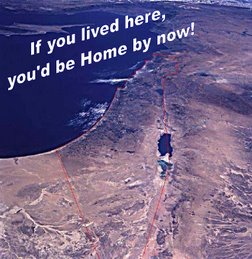I was looking at the pasuk that you are supposed to say when you visit a house of mourning.
"May you be comforted with all of the mourners of Zion and Jerusalem."
What does that mean?
This past Tisha B'Av was very surreal to me. I realize now that I will, B'Ezrat Hashem, never have to spend another Tisha B'Av in Chutz L'Aretz, whether it's a day of sadness or of joy.
But as I was sitting on the floor in shul, listening to the conversations that were going on around me, it made me wonder why we're doing this.
I can tell you for sure that the teenagers weren't getting it, with a comment every so often about how hungry they were, or how uncomfortable sitting on the floor was. Not a lot of mention of the loss of the Beit Hamikdash.
But it wasn't only the teenagers, I overheard two guys talking about sports, more discussing trips they would be taking after Tisha B'Av was over.
Not a lot of tears, I can tell you that.
The only person who I did see cry was the Rabbi, while were saying the Kinah about the loss of people in the Holocaust.
I cried later, after shul was over. The atmosphere there was simply not conducive to an environment of sadness.
I went home and I cried for three hours.
I cried because we didn't have the Beit Hamikdash. I cried for how desensitized everyone around me was. I cried for the loss of Jewish lives in the world. I cried for Jews who were thrown out of their homes.
I then cried the next day, as I was listening to someone describe how you could really feel the destruction when you spent Tisha B'Av night at the Kotel.
Apparently the Kotel also is a social scene on Tisha B'Av, but the fact that you're there, the place where the Beit Hamikdash stood, and you look over the Kotel and all you see is black. Even if it's a social scene, it makes a big difference when you can actually see it, and physically be there.
This desensitization is brought to light in the pasuk "mourn like the mourners of Zion and Jerusalem."
When someone dies, you cry. You just do, and no one will look at you funny because they understand. If someone were to start hysterically crying for seemingly no reason, and when asked why he was crying, he answered "because we no longer have a Beit Hamikdash," in all honesty, what would you think about him?
The reason we say "mourn like the mourners of Zion and Jerusalem," is because the feeling one gets when a loved one dies should be the same exact feeling one should have about absence of the Beit Hamikdash!
Why don't we have this feeling? Maybe because we were never taught about the importance of the Temple or why we should be sad that it is destroyed. I don't know the answer, but I do know that we live in a generation where all the outside world wants to do is to desensitize everybody. News stories of death are told in the exact same tone as a news story about the installation of a new traffic light.
Get with the picture and think about what's really important. We only have one life, and it's up to us to decide how we're going to use it and what kind of a difference we are going to make.
"May you be comforted with all of the mourners of Zion and Jerusalem."
What does that mean?
This past Tisha B'Av was very surreal to me. I realize now that I will, B'Ezrat Hashem, never have to spend another Tisha B'Av in Chutz L'Aretz, whether it's a day of sadness or of joy.
But as I was sitting on the floor in shul, listening to the conversations that were going on around me, it made me wonder why we're doing this.
I can tell you for sure that the teenagers weren't getting it, with a comment every so often about how hungry they were, or how uncomfortable sitting on the floor was. Not a lot of mention of the loss of the Beit Hamikdash.
But it wasn't only the teenagers, I overheard two guys talking about sports, more discussing trips they would be taking after Tisha B'Av was over.
Not a lot of tears, I can tell you that.
The only person who I did see cry was the Rabbi, while were saying the Kinah about the loss of people in the Holocaust.
I cried later, after shul was over. The atmosphere there was simply not conducive to an environment of sadness.
I went home and I cried for three hours.
I cried because we didn't have the Beit Hamikdash. I cried for how desensitized everyone around me was. I cried for the loss of Jewish lives in the world. I cried for Jews who were thrown out of their homes.
I then cried the next day, as I was listening to someone describe how you could really feel the destruction when you spent Tisha B'Av night at the Kotel.
Apparently the Kotel also is a social scene on Tisha B'Av, but the fact that you're there, the place where the Beit Hamikdash stood, and you look over the Kotel and all you see is black. Even if it's a social scene, it makes a big difference when you can actually see it, and physically be there.
This desensitization is brought to light in the pasuk "mourn like the mourners of Zion and Jerusalem."
When someone dies, you cry. You just do, and no one will look at you funny because they understand. If someone were to start hysterically crying for seemingly no reason, and when asked why he was crying, he answered "because we no longer have a Beit Hamikdash," in all honesty, what would you think about him?
The reason we say "mourn like the mourners of Zion and Jerusalem," is because the feeling one gets when a loved one dies should be the same exact feeling one should have about absence of the Beit Hamikdash!
Why don't we have this feeling? Maybe because we were never taught about the importance of the Temple or why we should be sad that it is destroyed. I don't know the answer, but I do know that we live in a generation where all the outside world wants to do is to desensitize everybody. News stories of death are told in the exact same tone as a news story about the installation of a new traffic light.
Get with the picture and think about what's really important. We only have one life, and it's up to us to decide how we're going to use it and what kind of a difference we are going to make.




No comments:
Post a Comment